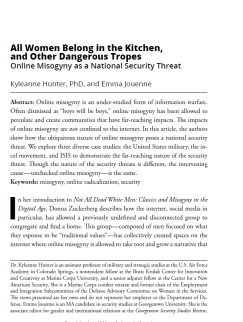This article considers online misogyny as a form of information warfare and therefore a threat to national security. The research focuses on two hypotheses from three case studies: 1) the US military; 2) the Incel movement and 3) ISIS. “Their [online misogyny communities] beliefs on masculinity center on toughness, strength, power, and dominance and espouse a hierarchical ordering principle that views women as ‘less than’ due to a rigid ‘gender system.’ This ideology creates rules of distinctive separation linked to beliefs about masculine and feminine norms, and it attributes higher value to things perceived as masculine.” Thus, the article's hypotheses are 1) “Online misogyny makes recruiting [women] into the military more difficult”; 2) “Online misogyny intensifies violent tendencies of radical groups.” The authors used focus groups to corroborate the first hypothesis and discourse and content analysis to analyze the second, which relates to the activities of Incel and ISIS communities. To combat online misogyny the US security sector must take gendered approaches to security, but it is not enough to increase the number of women in the sector, it must take into account their perspectives and have an ecological and holistic perspective that prevents violence. This implies approaches that include social, educational, and health policies that eliminate the causes that lead to easy recruitment into extremist groups.
2021
